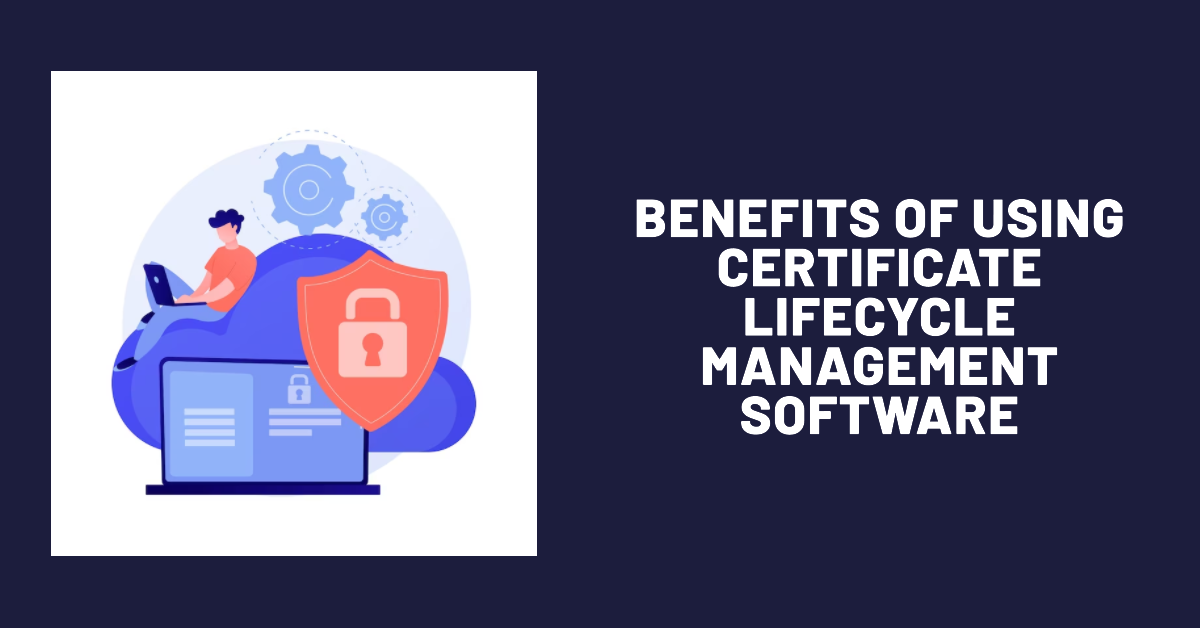In today's digital landscape, characterized by paramount concerns for data security and privacy, effective digital certificate management has risen to a central role for businesses.
Digital certificates serve as critical safeguards for ensuring secure communication, user authentication, and data integrity. To streamline the complex task of certificate management, many businesses have turned to the assistance of Certificate Lifecycle Management (CLM) software.
Within this article, we will delve into the top eight advantages of employing Certificate Lifecycle Management software.
- Enhanced Security
Elevated security stands out as a paramount advantage when embracing a certificate management solution. Digital certificates play a pivotal role in safeguarding communication channels and verifying the identities of users and devices.
Nonetheless, without proper management, certificates can become outdated or compromised, rendering security vulnerabilities. The Certificate Management Solution automates the complete lifecycle of certificates, ensuring swift issuance, renewal, and revocation processes.
As a result, the risk of unauthorized access and data breaches is significantly diminished, fortifying an organization's overall security posture.
2.Streamlined Operations
Manual certificate administration can be quite error-prone and time-consuming. CLM software, on the other hand, advances automation by handling crucial certificate management operations like issuance, renewal, and revocation.
Through automation, processes are streamlined, administrative costs are substantially decreased, and the likelihood of human error is significantly reduced.
When routine certificate administration is handled by CLM software, IT staff are free to focus on more strategic activities, increasing overall productivity and enabling a more effective resource allocation within the organization.
3.Cost Savings
Efficient Certificate Lifecycle Management (CLM) translates into substantial cost savings. The automation of certificate management processes enables organizations to sidestep expensive outages and security incidents stemming from expired or compromised certificates.
Furthermore, CLM software aids organizations in optimizing their certificate utilization, steering clear of needless expenditures associated with excessive provisioning. In essence, the adoption of CLM not only safeguards against financial losses incurred through disruptions but also ensures that resources are allocated judiciously, aligning security needs with budgetary constraints.
This duality of cost-effective prevention and resource optimization makes CLM a valuable asset for organizations aiming to safeguard their bottom line while fortifying their digital security.
4.Compliance Assurance
Numerous industries impose stringent regulatory prerequisites on certificate management. Failure to adhere to these mandates can expose organizations to substantial fines and reputational harm.
CLM software plays a pivotal role in aiding organizations in upholding compliance by meticulously overseeing certificate management in accordance with industry-specific norms and best practices.
Moreover, it furnishes robust audit trails and sophisticated reporting capabilities, facilitating the presentation of tangible evidence of compliance to auditors and regulatory bodies. This not only shields organizations from financial penalties but also upholds their reputation as responsible and compliant entities within their respective sectors, fostering trust among stakeholders.
5.Centralized Visibility
Certificate Lifecycle Management (CLM) software serves as a beacon of centralized visibility within an organization's expansive certificate ecosystem.
Empowering IT administrators with the ability to comprehensively monitor all certificates in use, encompassing SSL/TLS certificates, code signing certificates, and beyond, this visibility emerges as a critical asset.
It enables the vigilant tracking of certificate expirations, the swift identification of looming security risks, and the facilitation of well-informed decisions regarding certificate management strategies. In a digital landscape characterized by constant evolution and heightened security concerns, this centralized insight equips organizations with the foresight and control needed to safeguard their digital assets effectively.
6.Improved Certificate Inventory Management
Particularly within large enterprises, the thorough tracking of certifications can be a daunting task. CLM software, on the other hand, skillfully overcomes this difficulty by creating and keeping a thorough inventory of all certifications.
This inventory encompasses crucial details such as certificate type, issuer, expiration date, and usage specifications. Consequently, the software simplifies identifying and efficiently managing certificates, significantly diminishing the likelihood of oversights.
CLM software is a dependable ally in a time when accuracy and oversight are crucial to maintaining the integrity of digital security. It makes sure that no certificate is overlooked or unmanaged.
7.Efficient Troubleshooting
Without the right tools, handling certificate-related difficulties can be a difficult undertaking. The visibility and reporting capabilities required to swiftly find and address certificate-related issues are provided by CLM software, which closes the gap as a vital asset.
This proactive method significantly reduces downtime and lessens the effects on users and systems.
CLM software serves as a dependable problem solver in our digitally dependent world, where even minor disruptions can have significant effects. It quickly locates, addresses, and fixes certificate problems, ensuring operational stability and positive user experiences.
8.Scalability
Naturally, as businesses grow online, so does the need for certificate management.
CLM software is the epitome of adaptability, growing without difficulty to meet an organization's changing needs. Its adaptability is suitable for companies of all sizes, from start-ups to multinational corporations.
It effectively handles certificates across numerous domains, servers, and devices, guaranteeing flexible and ongoing support for the organization's changing technological environment and growing online presence.
Conclusion
Certificate Lifecycle administration (CLM) software offers a wide range of benefits for companies looking for effective digital certificate administration.
CLM software plays a crucial role in maintaining the security and integrity of a company's digital infrastructure. Additionally, it improves security, consolidates processes, reduces costs, and ensures compliance.
The importance of trustworthy certificate management tools like CLM software is immeasurable as the digital landscape continues to develop.





Comments